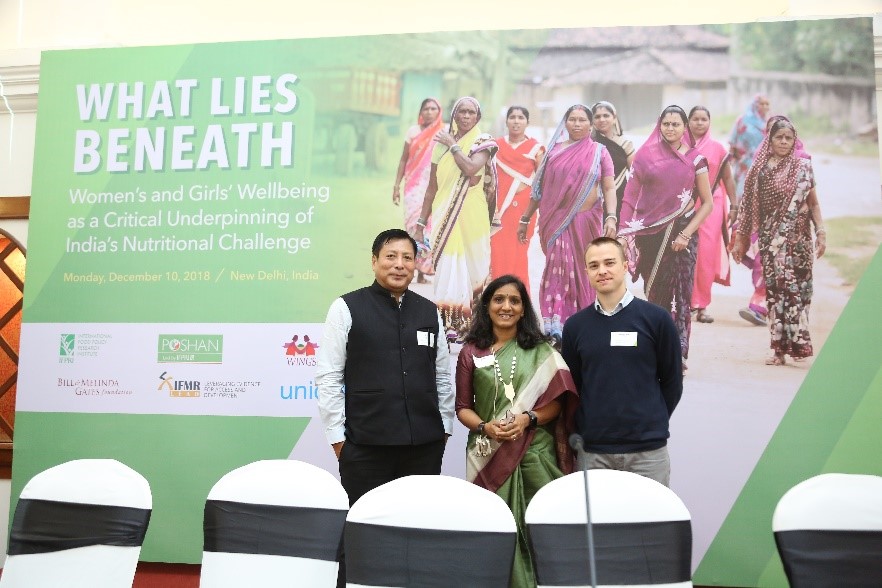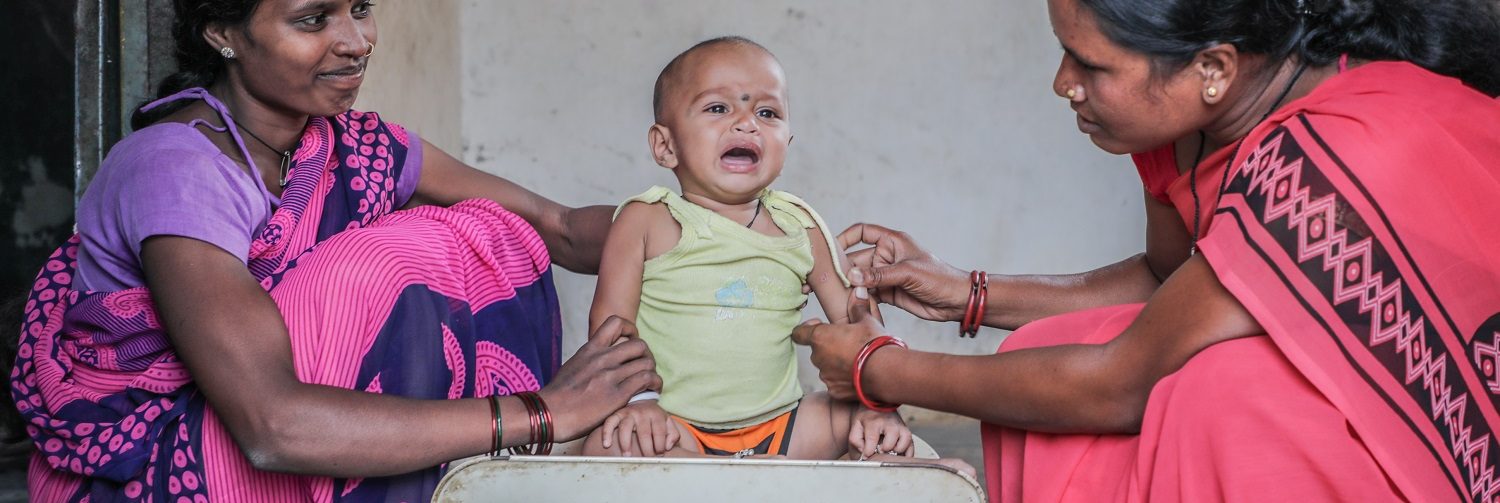
T Longvah (left), from the National Institute of Nutrition, with Purnima Menon (center) and Samuel Scott (right) from IFPRI, at the inaugural session (Image: POSHAN team)
At an event “What Lies Beneath: Women’s and Girls’ Wellbeing as a Critical Underpinning of India’s Nutritional Challenge”, organized by the International Food Policy Research Institute (IFPRI), in collaboration with the Bill and Melinda Gates Foundation, EPoD India at IFMR, Naandi Foundation and UNICEF India, on December 10th in New Delhi, researchers, development partners, and policy makers discussed the evidence on different aspects of women’s and girl’s wellbeing that are critical for India’s nutritional challenge.
Setting the tone of the event, Purnima Menon, from IFPRI, explained why gender matters for nutrition. She presented evidence from an IFPRI study that shows factors related to gender, poverty and health services account for much of the difference between high and low stunting districts. Another study validates that factors related to gender, poverty and health services account for changes in anemia over time – both for women and for children. Since it is evident that gender-related issues underlie various forms of malnutrition, it is essential to analyse if we are doing enough to tackle what lies beneath India’s malnutrition challenge. Elaborating on a recent IFPRI study, Samuel Scott, from IFPRI, described the pathways from early marriage to poor child growth in India and reinforced the need for targeting policies at delayed marriage to be a crucial part of efforts to address childhood stunting.
The second session at the conference focused on insights from the global evidence on what works to address women’s wellbeing. In this session, Rohini Pande, from Harvard University and EPoD, talked about the widespread challenge of son preference in India, and linked it to stunting. She also presented evidence on the need to change power dynamics through public policy and affirmative action. “Nutrition interventions alone are not enough,” she said. Building on this, Agnes Quisumbing, from IFPRI, shared global evidence from research by IFPRI and many other partners on agriculture and rural development interventions to improve women’s and girls’ wellbeing. She emphasized impacts on asset ownership by women and reflected on some of the challenges of measuring women’s empowerment. As session chair, Dr. Poonam Muttreja, from Population Foundation of India, emphasized on investing in girls’ education.
In a third session on evidence from India on strengthening women’s and girls’ wellbing, Dr. Neha Kumar, from IFPRI, presented evidence on improving nutrition through women’s group platforms. “Self-help groups are not a panacea for change across the board,” she added, emphasizing the importance of systematic evidence-building on various outcomes that could be triggered by women’s group programs. Shireen Jejeebhoy, from AKSHA Centre for Equity and Wellbeing, shared the evidence on specific strategies to address educational attainment, early marriage and other empowerment outcomes in India. Insights from developing a program to strengthen social movements to end child marriage and dowry in Bihar were discussed by Mona Sinha, from UNICEF. These presentations led to animated discussions and participants tried to look at interlinkages and correlations that could lead to multisectoral convergence.
The event concluded with a focused session on adolescent girls, their aspirations and wellbeing. Sharing the findings of the recent Teenage Girls Survey 2018 (TAG Survey), which is a direct conversation with girls across India through a large-scale survey, Rohini Mukherjee, from the Naandi Foundation, gave some heartening news about the current educational status and future aspirations of a large majority of teenage girls. “However, there are serious concerns pertaining open defecation, menstrual hygiene, low BMI and anemia, which need to be urgently addressed,” she said. Taking a closer look at the lives and aspirations of adolescents, Sachin Shinde, from Population Council, shared the findings of the UDAYA survey in Bihar and Uttar Pradesh, which looks at the situation of adolescents and assesses the quality of transitions from adolescence to adulthood. A rich discussion ensued on the challenges of supporting successful transition to adulthood, both for girls and boys.
“These conversations are very encouraging. They have taken us back to these critical underpinnings of India’s malnutrition challenge – the wellbeing of girls and women. It is not sufficient to just roll out programs to address these; the convening has also highlighted the need to build evidence on what works,” said Purnima Menon, from IFPRI.
Please find here the presentations that were shared and some photographs of the event.


